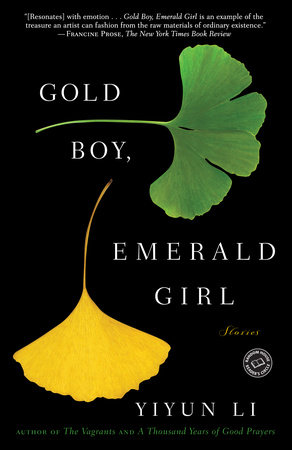Book Club Discussion Questions
In a book club? Subscribe to our Book Club Newsletter and get our best book club books of 2025!
For supplemental discussion material see our Beyond the Book article, Beijing and our BookBrowse Review of Gold Boy, Emerald Girl.
Please be aware that this discussion guide will contain spoilers!
- It seems that none of the stories from the collection can straightforwardly be called a happy story, yet happiness is never far from the characters’ minds. For instance, in “Kindness,” Moyan describes her happiness looking at trees, saying: “I loved trees more than I loved people; I still do.” In “Souvenir,” the unnamed young woman believes that she was happiest when she sat with a young man who had gone crazy from torture, because she could be like a piece of harmless furniture to him. What are other instances of happiness for the characters in this collection? What have the characters given up to achieve their happiness, and what do these compromises reveal about the characters and the time they live in?
- Every one of the stories in the collection has a love story, or several love stories, in it. What are the moments in these stories when love transcends the bleakness and “fatality of humankind,” as the young woman in “Souvenir” calls it at the end of the story?
- Many of the stories are set in China at a time when the modern world clashes with traditions, creating situations that baffle the characters and change their lives in one way or another. For instance, in “The Proprietress,“ a young woman finds herself the object of a great deal of media attention when she petitions to have a baby with her husband, who is on death row. What are some other situations that you find especially fascinating or perplexing in these stories? Do you think these situations are particular to life in China, or are they more universal?
- The beauty of human memory is that, in any given moment, each of us is living multiple lives, anchored in different time periods—our decisions and perceptions about our lives reflect not only the present moment but also what has been carried on in our memories. History, especially Chinese history in the past fifty years, has given Li’s characters richly layered memories. Which of their memories moved you most, and why?
- Many of the stories feature older characters—an old woman unwilling to give her son and daughter-in-law control of her life in “The Proprietress”; Teacher Fei, the retired art teacher, and his mother in “A Man Like Him”; the six friends who establish a business to fight against extramarital affairs in “House Fire.” What do you think Li, a writer in her thirties, has done to make these characters believable? What makes their stories important and compelling?
- Many of the stories are set in China, which, in the past thirty years, has transformed itself with dazzling speed. Yet in any society, during any given period, human nature evolves at a much slower pace. What are some of the beauties and follies of human nature that you have seen in the characters that seem to have remained unchanged, despite the surface excitement of a new country and a new millennium?
- The centerpiece of the collection is the novella “Kindness.” What sorts of kindness and unkindness are present in the novella? And in the other stories? How do the characters in these stories come to term with the kindness and unkindness of their fates?
- Despite the major and minor tragedies many of these characters have to live with, there are moments in each story when a character allows him- or herself to envision a future that is at least a little better than the past, or the present. In “Number Three, Garden Road,” the two neighbors allow themselves to be “happily occupied” in the falling dusk by the music of an old banjo; the title story, “Gold Boy, Emerald Girl,” ends with Siyu’s thought that “they were lonely and sad people, all three of them, and they would not make one another less sad, but they could, with great care, make a world that would accommodate their loneliness.” What are other instances when the characters, despite the harshness or bleakness of their lives, do not lose their ability to imagine a better future?
- Li grew up in China, and English is not her first language. Is there anything about her writing that would indicate this to you, if you didn’t know already? What do you think makes her writing stand out, as a writer in a second language?
Unless otherwise stated, this discussion guide is reprinted with the permission of Random House.
Any page references refer to a USA edition of the book, usually the trade paperback version, and may vary in other editions.
